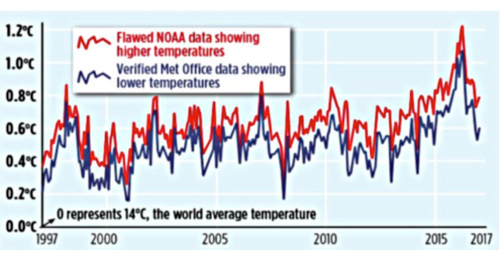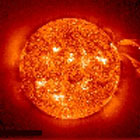 |
|||||||
|
|||||||
|
US Congress to investigate shonky climate reportPeter WestmoreThe United States Congress will investigate America's National Oceanic and Atmospheric Administration (NOAA), following revelations by a senior climate scientist that the government agency faked evidence to claim that global temperatures had soared over the past 20 years, contradicting earlier evidence of a 20-year pause. The NOAA report, which was strongly endorsed by the former Obama Administration just before the recent Paris Climate Conference, was used to justify the conference demand for continuing cuts in global carbon dioxide emissions.
Dr Bates was one of the top climatologists at the NOAA. He was principal scientist with the U.S. National Climate Data Centre, part of the NOAA. His technical expertise lies in atmospheric sciences, and his research interests include satellite observations of the global water and energy cycle, air-sea interactions, and climate variability. He has written over 45 publications and was elected to the 15-member board of directors of the American Geophysical Union (AGU), an organisation that he joined in 1986. RecognitionIn 2014, the Obama Administration awarded him a special gold medal for his work in setting new, supposedly binding standards "to produce and preserve climate data records". In an interview with a London newspaper, Dr Bates revealed that the lead author of the paper, Thomas Karl, had insisted "on decisions and scientific choices that maximised warming and minimised documentation … in an effort to discredit the notion of a global warming pause, rushed so that he could time publication to influence national and international deliberations on climate policy". Karl was until last year director of the NOAA section that produces climate data -- the National Centers for Environmental Information (NCEI). While working for NOAA, Dr Bates objected to the Karl report, arguing that it had not been properly prepared, and that its conclusions were unsound. He was over-ridden. NOAA's 2015 paper was based on two new sets of temperature data -- one containing measurements of temperatures at the planet's surface on land, the other at the surface of the seas. Both datasets were flawed. The land temperature dataset used by the study was afflicted by devastating bugs in its software that rendered its findings "unstable". The paper relied on a preliminary version of the data that was never approved or verified. This magazine has learnt that NOAA has now decided that the sea dataset will have to be replaced and substantially revised just 18 months after it was issued, because it used unreliable methods that overstated the speed of warming. The revised data will show both lower temperatures and a slower rate in the recent warming trend.  For almost two years, the U.S. House of Representatives Committee on Science, Space and Technology has been trying to understand the Karl report. It was originally briefed by NOAA about the report, but when it approached NOAA, it found superficial co-operation. But when it probed further, NOAA repeatedly refused to supply requested information. After a year, the committee hit a brick wall. The Obama Administration was not interested in helping the committee by enforcing the law. Committee chairman Lamar Smith issued a statement which said: "Over the course of the committee's oversight, NOAA refused to comply with the inquiries, baselessly arguing that Congress is not authorised to request communications from federal scientists. "This culminated in the issuance of a congressional subpoena, with which NOAA also failed to comply. During the course of the investigation, the committee heard from whistleblowers who confirmed that, among other flaws in the study, it was rushed for publication to support President Obama's climate-change agenda." Mr Smith said, the Karl report "retroactively altered historical climate-change data, which resulted in the elimination of a well-known climate phenomenon known as the "climate-change hiatus". "The hiatus was a period between 1998 and 2013 where the rate of global temperatures growth slowed. "This fact has always been a thorn in the side of climate-change alarmists, as it became difficult to disprove the slowdown in warming. The Karl study refuted the hiatus and rewrote climate-change history to claim that warming had in fact been occurring." The Congressional Committee chairman welcomed Dr Bates' public statement and thanked him "for courageously stepping forward to tell the truth about NOAA's senior officials playing fast and loose with the data in order to meet a politically predetermined conclusion". Under the new President, Donald Trump, the matter will now be properly investigated.
|
|
|

 The staggering claims were made by Dr John Bates, who worked for the agency for 40 years before retiring recently. Dr Bates revealed that he had drawn attention to these issues while working for NOAA, but was over-ridden.
The staggering claims were made by Dr John Bates, who worked for the agency for 40 years before retiring recently. Dr Bates revealed that he had drawn attention to these issues while working for NOAA, but was over-ridden.


